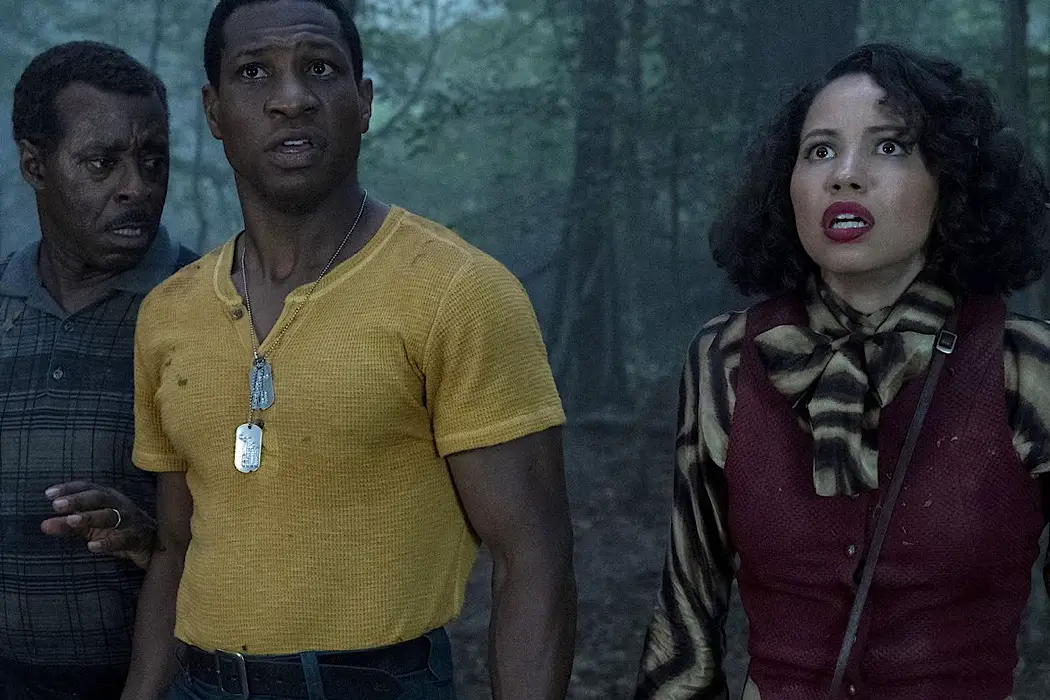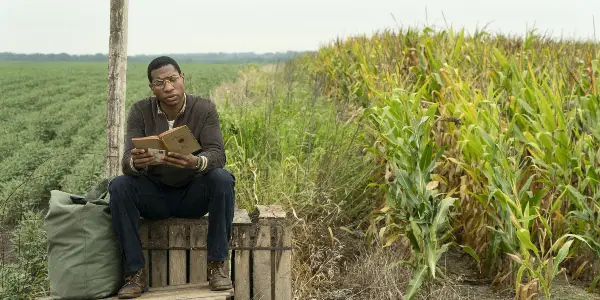LOVECRAFT COUNTRY Season 1: An Epic & Terrifying Horror Of American Racist History

Reyzando Nawara is a passionate film and TV enthusiast from…
There are two types of monsters in HBO’s compelling horror series Lovecraft Country (created by Misha Green and executive-produced by Jordan Peele and J. J. Abrams). The first one is fictional, mostly inspired by the work of the show’s titular H. P. Lovecraft in the form of a beast-like creature known as Shoggoth, while the second one is factual: the monster of American racist history and white supremacy that Black people have to deal with every day of their lives. The latter is part of the many reasons why Lovecraft Country feels almost entirely different than any other shows you’ve seen in the last few years. It juggles between a lot of genres — from gore and fantasy to sci-fi — while presenting the audience with a reality where no monsters are more terrifying than the one closest to us: discrimination and racism.
To be Black in Jim Crow’s America
Adapted from Matt Ruff‘s 2016 book of the same name, Lovecraft Country centers its story around Atticus Freeman (Jonathan Majors), a Korean war veteran who has a big interest in the Lovecraftian pulp fiction. When he’s first introduced, he has just arrived in Chicago from Florida to meet his uncle George (Courtney B. Vance). The real reason he goes back home, however, isn’t some warm family occasion, but it’s actually to find his father Montrose (Michael Kenneth Williams), whose whereabouts are unknown. The only clue about him that Tic has is just a cryptic letter informing him that he must claim his “sacred birthright” in Ardham, Massachusetts.

So in an attempt to bring Montrose home, Tic, along with George and a childhood friend named Letitia Lewis (Jurnee Smollett), embarks on a cross-country journey, where life-or-death risks are waiting in every corner. There’s a group of white men shooting George’s car when they realize that they’re Black. There’s also a policeman who threatens to lynch them if they don’t get out of his town by the time the sun goes down. And of all these bigoted acts do not just happen in the first episode, but also throughout all five episodes of the first season that are available for reviews.
In the second episode, there’s a cult-like group full of rich, white men who are deceiving Tic, George, and Leti for their own gains. Then in the brilliant third episode ‘Holy Ghost’, where the story focuses on Leti’s complicated relationship with her half-sister, Ruby (Wunmi Mosaku), the show delves even deeper into the aggression that white people throws toward Black folks. But it’s in the fifth episode ‘Strange Case’ — a body-swapping horror that seems like an episode of The Twilight Zone — where Lovecraft Country is at its best.

In it, we follow Ruby as she’s being seduced by an enigmatic character named William (Jordan Patrick Smith) with a potion that allows her to alter herself into a white woman; a rare opportunity for her to experience something that her true self might have never gotten. It’s an exceptional episode, and not just because of Cheryl Dunye‘s brilliant direction or Mosaku‘s standout performance. But also because of how Green, Jonathan Kidd, and Sonya Winton (the three credited writers of the episode) challenges us to see that the discrimination against Black people — particularly Black women, in this episode — does not just operate on a macro level, but on a smaller scale too.
It’s clear that Green isn’t just interested in telling one part of the Black experience; she wants to offer us a wide range of details about this issue and its relation with almost every aspect of life, from identity and sexuality to gender and self-worth. Yes, at times, all these topics can be a little too much, and the approach can seem unsubtle as well, but that’s exactly what, in the end, makes the show all the more remarkable. It dares to speak the truth about what it feels like to be Black in America in a way that feels unapologetic but still grounded in the emotions of its characters at the same time.
A High-Concept Horror
Even though the show’s exploration of race relations is what will make it the hot topic of the year, much like Watchmen from last year, Lovecraft Country, at its core, is still a horror show — and a brilliant one, I might add. Blood gets spattered here and there; body parts get chopped at almost every episode; monsters and ghouls are obviously making an appearance too. And all of these aren’t just for shocking value, but it also works to complement the show’s main thesis of exposing the real horror of white supremacy in America.
By integrating its depiction of anti-Blackness to the Lovecraftian cosmic horror universe, Lovecraft Country manages to create a deft comparison where the nightmares that come from these creatures aren’t exactly as terrifying as the one that comes from the American racism. You can always outrun or kill a Shoggoth, but with racism, it’s more complicated as it involves a system that has been damaged for far too long. This notion is made even more explicit by how the show oftentimes put its characters to face these two different monsters at the same time, like in the last 10 minutes of the first episode, only to further prove that the less threatening-looking ones are usually more dangerous than the flesh-eating creatures in the end.

This is a very smart concept and one that Green and his writers and directors execute brilliantly from the get-go. She knows how to jump between one genre to another all the while still maintaining the main premise of the show. And to make things even better, the talents on-screen are uniformly fantastic too. Majors, whose breakthrough role in last year’s underrated The Last Black Man in San Francisco has catapulted him into his early-stage of stardom, is able to show the many sides of his character in a way that is believable. His Tic is masculine but also vulnerable, and Majors brilliantly embodies every dimension of him. Kenneth Williams and Vance are equally great too. The former, in particular, is outstanding at displaying the pain his character is feeling inside.
However, it’s the female talents that steal most of the spotlights during the first five episodes. As one of the leading characters, Smollett‘s performance is always top-notch. A firecracker who takes no for an answer, her Leti is resilient and tough. But underneath that toughness, there’s a feeling of regret that Smollett is able to display carefully. The third episode is a full showcase of her talent. Mosaku is also phenomenal as Ruby. It’s her performance in episode five that becomes the highlight of the season so far. Aunjanue Ellis, Jada Harris, and Abbey Lee all leave great impressions too despite not having much of screentime in the first five episodes.
Final Thought
Lovecraft Country, in the end, is not without its flaws; the semi-anthology format can at times make the pace a little uneven, and there’s one central relationship that needs more development too. But other than that, Lovecraft Country is a knockout of a show and one that is epic, terrifying, and relevant altogether. If the rest of the five episodes can maintain what the first half of season one has established (which I believe they will), there’s no question that this can be HBO’s best show of the year.
What do you expect from the first season? Let us know in the comments below!
The first episode of Lovecraft Country Season 1 will air Sunday, August 16 at 9 p.m. ET/PT on HBO.
Watch Lovecraft Country
Does content like this matter to you?
Become a Member and support film journalism. Unlock access to all of Film Inquiry`s great articles. Join a community of like-minded readers who are passionate about cinema - get access to our private members Network, give back to independent filmmakers, and more.
Reyzando Nawara is a passionate film and TV enthusiast from Indonesia. When he's not watching TV and movies, he likes to cook and make sorbet.













